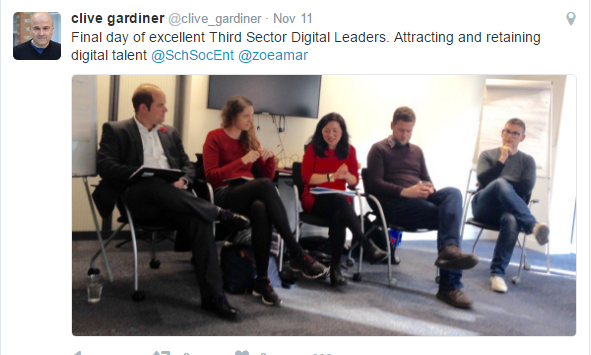Our very first cohort of students graduated from the Third Sector Digital Leaders programme last week. For those who don’t know it, it’s an intensive four day programme that we run in partnership with The School for Social Entrepreneurs. I’m really proud of it as it’s the first digital leadership skills training programme of its kind in England and Wales. It equips the leaders and senior management of charities and social enterprises with the skills they need to survive and thrive in the digital age.
You can read more about the course here and we will be running it again in 2017. And here’s a roundup of what we covered on Days 1 and 2 on the course last month.
On Days 3 and 4, we once again had excellent feedback about our speakers. Here’s a quick summary of the main highlights from the final block of the course.
- Amanda Derrick (ex of GDS) and now a digital consultant talked about her experience of transforming service delivery, working with stakeholders such as the DWP and local authorities. Her top tip for digital service design was to focus on the outcomes and how technology could enable them. What struck me as I was listening to her presentation is the ‘true grit’ required for digital transformation. She recommended that charities be honest about the barriers to delivery from the outset and, above all, focus on seeing everything through. As she pointed out, ‘disruption is no good unless you get to completion.’
- Graeme-Manuel Jones, Digital Communications Manager at Diabetes UK shared his inspiring experience of digital service delivery and agile working. We learned about the huge amount of work he and his charity had put into transforming their services so they could help more people. He spoke about how incremental change could be as powerful as widescale disruption, and how sometimes ‘agile by stealth’ can be a good way to get people working and thinking differently in your charity.
Then we were onto the next session, which was on big data, metrics and cybersecurity.
- Clare Bamberger, Chief Development Officer of Insight-ful discussed big data and worked through some exercises about this with delegates. She introduced them to the idea of data as currency and data as the new philanthropy.
- Matt Collins, MD of Platypus Digital (and one of our favourite collaborators over here at our agency) shared his views on vanity metrics (the big numbers that sound good but don’t really tell you anything, e.g. visits to website) and sanity metrics (e.g. the ones which show your charity is achieving its mission e.g. donations, how many people signed up to events etc). His top tip? In a world where you can measure most things, focus. So, what is the No 1 thing you want your audience to do?
- Brian Shorten, Chair of the Charities Security Forum presented on information security issues. It was pretty scary stuff and he got everyone thinking about the role of regulation, business continuity and, for those who hadn’t done it already, encrypting our laptops ASAP.
In the final session we looked at the all important issue of digital skills. The fact is that you can’t do digital transformation if you don’t have the right people and their knowledge in the building.
- Matt Adams, Senior Consultant at TPP Recruitment shared his views on the market. He counselled against slow, clunky recruitment processes as digital skills are in high demand. He told us how 50% of digital roles in charities are filled from outside the sector. Charities also need to think about how their brand and their culture can attract- and be a good fit- for disruptive, innovative digital types.
- Jo Wolfe, Assistant Director of Digital at Breast Cancer Care, explained how her team is structured. We don’t talk often enough in digital about the benefits of a really thorough, well thought out approach to team structure, but Jo showed us its value. She also shone a light on the need for soft skills and how both managers and executives in digital teams need to challenge each other to get the best results. Charities may not have big budgets for recruitment so Jo has rightly hired for potential and helped talented candidates grow into their roles. Charities need to sell the journey and the learning experience, not the job.
- Paul Thomas, Head of Digital at Grant Thornton UK shared his ambitious and exciting plans to build a networked team at the heart of the business that owns digital and empowers other teams to develop their skills. He explained how digital is changing all roles (not just digital ones). He encouraged charities to define ‘what digital means to you.’ Grant Thornton UK are doing some fascinating work in digital business development and he encourages colleagues to utilise this approach, i.e. digital to an analogue end or ‘digital to handshake.’ Is this something your charity should consider?
All three of our speakers suggested that nonprofits identify new or current staff who can be change agents, and that they look into reverse mentoring.
Following this, I led a final session on digital strategy, where we discussed the key steps to put in place before developing a strategy, a strategy framework and how to assess risk.
We would like to say a huge congratulations to our lovely students. They were super keen, asked great questions and had such good ideas that the class of 2017 have big shoes to fill!
We were really delighted by the feedback about the course too.
If you couldn’t make the course first time, don’t worry. We will be running it again in the spring. More details here.





